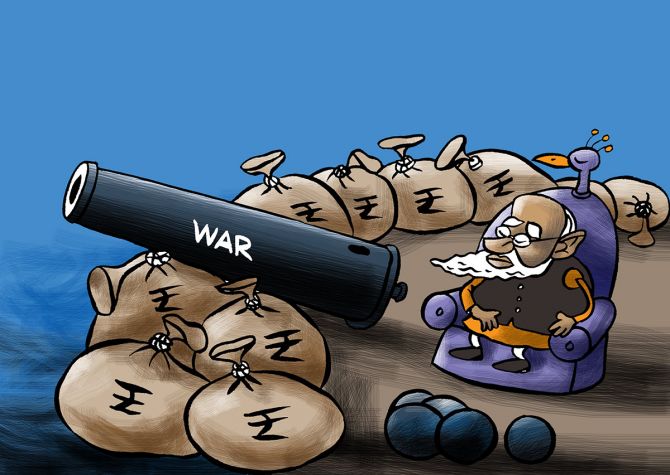That's why he is now finally focusing on the two things that alone can help: Fiscal expansion -- from December onwards -- and supply management via amended laws and rules that affect business, notes T C A Srinivasa-Raghavan.

Over the past 30 years, Western economists and their Indian chelas, in zealously hunting down central banks and governments, have developed a massive body of literature to show how the monetary and fiscal policies of a country must have just one target each.
Central banks, they say, should target only inflation and governments must target only the fiscal deficit. Both, they say, should be low and stable.
This sounds both sensible and easy. Except, of course, that it isn't, because there is a third variable invisible to economists: Employment.
So what the economists keep demanding is like saying that the government and the central banks must make an omelette -- but should prevent the other from breaking the egg, which, in this context, would mean not lowering employment or what's not the same thing, increasing unemployment.
That's not the only thing. This demand creates a problem that is the equivalent of Hotelling's ice-cream-vendors-on-the-beach problem or, if you like, that later mutant of it, Taylor's trilemma.
Basically, these theorems say that three variables can never be in equilibrium, never mind what they are. This is precisely true of unemployment, inflation, and the fiscal deficit.
Moreover, all three are primarily political problems. The solutions are therefore political and intimately connected to the electoral cycle.
Economists just don't seem to get this.
Three questions
That said, three questions remain for economics, if not the high priests of targeting.
First, is the very idea of targeting good or bad?
Second, is targeting a single variable good or bad?
Third, is the strict condition that the egg not be broken good or bad?
On the first, my view is that macroeconomic targeting is itself silly. It's like asking someone to drive at the same speed, regardless of traffic conditions.
The point is this: Macroeconomic management is a function of many things and is pretty much done month by month, depending on what is actually happening -- not regardless of it.
That's why economists who have been insistently demanding that the government should spend a lot immediately, have got it only half right.
Spend, yes, of course; but immediately? What happens if China attacks?
There's still about 50 days left before winter sets in fully. Should not some fiscal room be left for that contingency?
Contingent discretion
So, it's not that a government will not spend. Rest assured, it will. It is, after all, in its political interests to do so. Cats don't need persuasion to drink milk unless they have upset stomachs.
But timing is something that economists can dictate only as much as spectators can tell a batsman what shot to play and when. If batting is a dependent variable, so is government spending.
So then: If the idea of targeting is itself bad, what can we say about single-variable targeting?
The less the better, because once again that's not how governments or central banks can, or should, work. Indeed, they can't.
Both require considerable degrees of freedom to deal with situations.
Single-variable targeting restricts them almost completely. To free themselves they practise all kinds of counter-productive subterfuge.
And, finally, the contradiction between low fiscal-deficit targets and low-inflation targets: This is so obvious that it doesn't bear reiterating.
In India, in particular, it is a non-starter. That's why our Budgets hide so much.
These two targets are necessities for the developed world's bond market. They need it for what they regard as financial stability.
We don't, at least not to quite the same degree because our financial stability is a function of more than just the stability of the bond market. Non-financial factors play a very large role.
The Modi mistakes
Nor should we forget that when between 2014 and 2019 Narendra Modi targeted keeping both of them low, unemployment went up massively, causing a huge deflation compounded by demonetisation.
In that sense, the virus has come as a blessing and not just for structural reform.
If the IMF held a gun to Narasimha Rao's head in 1991, it's the virus that has done it to Mr Modi.
That's why he is now finally focusing on the two things that alone can help: Fiscal expansion -- from December onwards -- and supply management via amended laws and rules that affect business.
It will all start paying off next year, if a border skirmish can be averted.
Till then, patience please.
Feature Presentation: Aslam Hunani/Rediff.com










